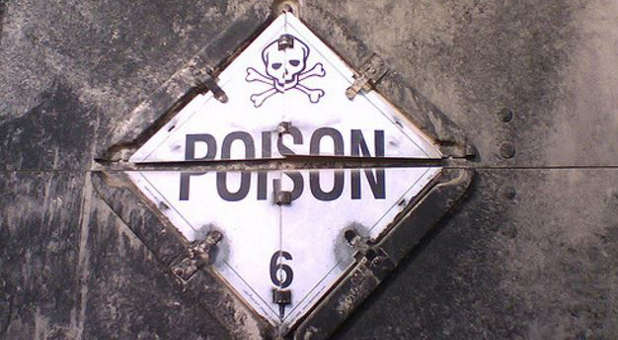
I read recently that thousands of churches close their doors every year. Who knows how many others are on life support? We live in a time when churches need revitalization and renewal. The eternal destiny of people depends on the faithful witness of local churches.
As I think about churches dying, I'm reminded there are certain poisons that are causes of death. I call them poisons because they are deadly, but they avoidable. The churches that die from them do so by their own hand.
Here are 10 poisons that will kill any church:
1. Performance without participation. Like concerts, movies and athletic events, much of our worship has become spectator-oriented. A handful of well-trained—perhaps paid—musicians perform for the masses. Too often, we enjoy entertainment without experiencing engagement.
2. Information without inspiration. With advancement in technology and a multitude of media sources, we are drowning in information. Clearly, this phenomenon has spilled over into the church. Sermons, conferences, seminars and Bibles studies are good, but some have sat and soaked so long that they've soured.
3. Mirrors without windows. Too many churches stare at themselves in the mirror, primping and preparing for the home town fans. Instead, we should be peering out windows, looking for local needs and global opportunities.
4. Attachment without commitment. Those who used to attend two or three times a month are now coming once or twice. Most people I run across claim an affiliation with a congregation, yet too many lack affection for its mission. They want to be included on the roll without taking a role.
5. Ritual without spontaneity. When a young man was asked why he didn't go to church, he replied, "I've been." Church services are too often boring, irrelevant and predictable. We speak a different language on Sunday than the rest of the week. We're saying the same things, singing the same songs, and voicing the same prayers.
6. Prosperity without generosity. Most congregants are employed and making decent money, yet this good fortune isn't spilling over into the offering plate. Tithers are dying and tippers are taking their place. "Donations are on course to drop by 70 percent within 25 to 30 years—due to the deaths of the most generous generations," says John Dickerson in The Great Evangelical Recession.
7. Addition without reproduction. Much of what we call church growth is actually sheep swapping. We play musical pews, as Christians hop from church to church. Some churches may be adding to their membership, yet how many of these constitute a net gain for the kingdom?
8. Birth without growth. It's wonderful when the nursery is full of newborns, yet not so good when they make up a sizable portion of the congregation each Sunday. If your first grade child or grandchild made an A on a test of one-digit addition and subtraction problems, you'd beam with pride. However, would you feel the same way if your high school calculus student aced that same set of problems?
9. Membership without conversion. According to Christian author and researcher George Barna "half of all adults who attend Protestant churches on a typical Sunday morning are not Christian." Having spent 14 years as an unsaved church member, I'm especially sensitive to this sad situation. A name on the church roll doesn't forward to the Lamb's book of life.
10. Duty without love. Too many 21st century congregations are modeling the first century church at Ephesus (Rev 2:1-7). Calendars are full but hearts are empty. Love for Jesus, fellow saints and one another is growing cold in these later days (Matt. 24:12).
I wish I had simple solutions to these critical issues. It'll take widespread revival to reverse these trends. In the meantime, while we pray for and anticipate such a move from God, we can strive to make sure the people we shepherd and churches we serve buck the trend.
Are there other poisons you've seen kill churches? If so, mention them in the comments. ![]()
Todd Gaddis has been a pastor since 1990 and currently serves at First Baptist LaFayette, Georgia. In addition to 11 books, he has written for Focus on the Family, Leadership, Pray, War Cry, and numerous LifeWay publications.
For the original article, visit lifeway.com/pastors.
Get Spirit-filled content delivered right to your inbox! Click here to subscribe to our newsletter.
Dr. Mark Rutland's
National Institute of Christian Leadership (NICL)
The NICL is one of the top leadership training programs in the U.S. taught by Dr. Mark Rutland. If you're the type of leader that likes to have total control over every aspect of your ministry and your future success, the NICL is right for you!
FREE NICL MINI-COURSE - Enroll for 3-hours of training from Dr. Rutland's full leadership course. Experience the NICL and decide if this training is right for you and your team.
Do you feel stuck? Do you feel like you’re not growing? Do you need help from an expert in leadership? There is no other leadership training like the NICL. Gain the leadership skills and confidence you need to lead your church, business or ministry. Get ready to accomplish all of your God-given dreams. CLICK HERE for NICL training dates and details.The NICL Online is an option for any leader with time or schedule constraints. It's also for leaders who want to expedite their training to receive advanced standing for Master Level credit hours. Work through Dr. Rutland's full training from the comfort of your home or ministry at your pace. Learn more about NICL Online. Learn more about NICL Online.


